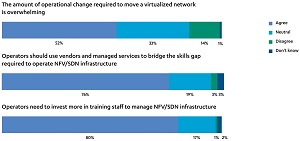News
Report: SDN/NFV Hampered by Skills Shortage, Other Challenges
A report says network virtualization efforts led by software-defined networking (SDN) and network functions virtualization (NFV) haven't lived up to their hype, hampered by a skills shortage, organizational/operational problems, multi-vendor integration issues and more.
Those are some of the main findings from the report titled "The Future of Networks: Dealing with Transformation in a Virtualized World" from Cartesian Inc., a consultant for the telecoms, digital media and technology industries.
Cartesian -- in collaboration with the Broadband Forum -- based its report on more than 40 interviews and more than 100 responses to an online survey, reaching out to decision-makers from industry players across several segments.
The report finds that while SDN and NFV are critical to meeting new network virtualization challenges in the industry -- and they clearly have momentum -- they have failed to live up to their hype, which has led many companies searching for a way to best leverage the new technologies.
One big problem holding them back is a lack of skilled workers, a common problem throughout the tech world and especially vexing in software development, which is a strong component of network virtualization.
"As the move to virtualized networks gathers pace, the industry is facing a skills gap," the report said. "Interviewees pointed to factors such as a lack of internal expertise and a need for more investment in training."
The problem is that virtualization and cloud network functions demand new skills, which are simply not available now. While industry sources point to the need for retraining, revamping recruiting processes and other measures over the long term, in the short term, organizations are looking to vendors, consultancies and managed services to address the skills shortage, as shown in this graphic:
 [Click on image for larger view.] The Skills Gap (source: Cartesian).
[Click on image for larger view.] The Skills Gap (source: Cartesian).
Other key findings of the report include:
- Enabling the faster delivery of innovative services and supporting the creation of new revenue streams consistently ranked as the most important business drivers for network virtualization.
- Network reliability is a key concern: 90 percent agree that virtualized networks need to be as reliable as the traditional networks they are replacing. The reliability and stability of NFV/SDN technology ranked as the biggest concern among respondents.
- NFV/SDN technologies haven't yet lived up to their early hype. Operators are finding it difficult proving their business cases due to higher than projected cost and longer than anticipated implementation of their virtualization initiatives.
- Multi-vendor integration is a challenge. In some cases, interoperability testing is being delayed by incomplete implementation of the NFV specifications.
- The distributed architecture creates uncertainty in terms of vendor accountability for network issue identification and resolution. Therefore, within an operator, the most cautious voices are frequently the people in charge of network operations.
- As well as technological changes, communication service providers (CSPs) are facing organizational upheaval which can put hurdles in the way of a smooth transformation. Fears around a lack of operations support and the trust factor between network and IT departments are at the heart of a cultural struggle.
- Removing silos is a key part of the process. Virtualization requires a multi-disciplinary, horizontal approach, where different departments (for example, applications vs. networks vs. security) must be able to work together to achieve the strategic aims.
- CSPs must continue to operate and maintain existing physical networks in parallel with the new virtualized infrastructure. Managing across this hybrid environment further complicates the operational task and was identified as a main cause of bottlenecks by 65 percent of respondents.
"Ultimately, our research confirms that network virtualization is the future and that the industry has already started on this journey," the report says in its conclusion. "But, there are certainly barriers that need to be overcome to smooth the path and integration process."
About the Author
David Ramel is an editor and writer for Converge360.